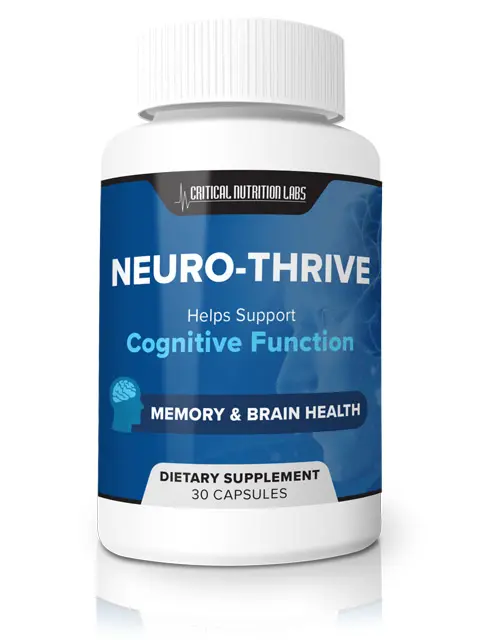October 1, 2024 – By Alex Magalhaes
Aging is a natural part of life, and while physical changes are expected, cognitive decline can often catch people off guard. For many, the first signs of cognitive decline may appear unexpectedly, impacting tasks that once seemed effortless—such as remembering names, maintaining focus on complex tasks, or quickly processing information. But what causes this decline, and how can we slow it down?
What Is Cognitive Decline?
Cognitive decline refers to the gradual reduction in mental abilities, including memory, attention, processing speed, and problem-solving skills. While it is a natural part of life, cognitive decline varies from person to person and is influenced by lifestyle, genetics, and overall health.
Why Does Cognitive Decline Occur?
Several biological and environmental factors contribute to the decline in cognitive function over time. These include:
- Reduced Brain Plasticity: Brain plasticity, or the brain’s ability to form new neural connections, tends to decrease with age. Studies have shown that this decline makes learning new information and recovering from mental fatigue more challenging. Research from Harvard Medical School highlights how brain plasticity is essential for learning and memory retention, both of which diminish as we grow older.
- Decreased Blood Flow to the Brain: Aging can reduce cardiovascular efficiency, leading to less blood flow to the brain. A study published in Frontiers in Aging Neuroscience found that decreased cerebral blood flow can limit the delivery of oxygen and essential nutrients to brain cells, thereby impairing cognitive function.
- Hippocampal Shrinkage: The hippocampus, a key brain region responsible for forming and retrieving memories, tends to shrink over time. Research published in Nature Reviews Neuroscience indicates that this shrinkage is closely linked to memory function decline.
- Hormonal Changes: Hormonal shifts can affect brain function. For example, changes in estrogen levels during menopause or testosterone levels in men can impact cognitive abilities. These findings have been supported by research from the Journal of Neuroscience.
- Oxidative Stress and Inflammation: Cells become more vulnerable to oxidative stress caused by free radicals, leading to inflammation and cognitive decline. A study from the Journal of Alzheimer’s Disease links oxidative stress to neurodegenerative conditions, such as Alzheimer’s, highlighting the importance of managing oxidative damage.
Common Cognitive Changes
Individuals may experience several cognitive changes over time, including:
- Slower Processing Speed: Tasks that involve decision-making, information processing, or switching between tasks may take longer.
- Memory Lapses: It may become easier to forget names, misplace items, or struggle to recall information that was previously easy to remember.
- Difficulty Concentrating: Sustaining focus on complex tasks for extended periods may become more challenging, making distractions harder to ignore.
- Reduced Problem-Solving Skills: Analytical tasks or logical reasoning exercises may feel more difficult as brain efficiency diminishes.
How to Combat Cognitive Decline
While cognitive decline is a natural process, several science-backed strategies can help slow its progression and preserve mental sharpness.
- Stay Mentally Active: The “use it or lose it” principle applies to brain health. Engaging in mentally stimulating activities, such as reading, puzzles, learning new skills, or playing memory games, can help maintain cognitive function. Research from the University of Edinburgh demonstrates that lifelong learning promotes brain plasticity, which helps slow cognitive decline.
- Exercise Regularly: Physical activity boosts blood flow to the brain, delivering oxygen and nutrients essential for cognitive health. Regular exercise also reduces the risk of chronic conditions, such as hypertension and diabetes, which are associated with cognitive decline. The British Journal of Sports Medicine found that moderate aerobic exercise significantly improves memory and cognitive function.
- Eat a Brain-Healthy Diet: Diet plays a crucial role in brain health. Foods rich in antioxidants, omega-3 fatty acids, and vitamins help protect brain cells from damage. The American Journal of Clinical Nutrition supports the cognitive benefits of including the following foods in your diet:
- Leafy Greens: Spinach, kale, and broccoli are packed with nutrients like vitamin K, lutein, and folate, which support cognitive function.
- Fatty Fish: Omega-3-rich fish, such as salmon and sardines, have been linked to improved memory and brain function.
- Berries: Blueberries and strawberries contain antioxidants that protect the brain from oxidative stress and support memory.
- Get Enough Sleep: Sleep is critical for brain health, as it allows for memory consolidation and the clearing of toxins that accumulate during waking hours. Poor sleep has been linked to faster cognitive decline and an increased risk of neurodegenerative diseases, such as Alzheimer’s. A study in Nature Communications found that 7-9 hours of quality sleep per night is optimal for brain health.
- Manage Stress and Anxiety: Chronic stress and anxiety can lead to memory problems and impaired cognitive function. According to research published in Psychoneuroendocrinology, high levels of cortisol (the stress hormone) can shrink the hippocampus and lead to cognitive impairments. Stress management techniques, such as mindfulness, meditation, or yoga, can help protect the brain from these effects.
- Consider Brain-Boosting Supplements: Certain supplements are designed to support brain health and may help mitigate cognitive decline. Ingredients like omega-3 DHA, ginkgo biloba, and Bacopa Monnieri, often found in products like Neuro-Thrive, are backed by research for their brain-boosting benefits. Studies in Evidence-Based Complementary and Alternative Medicine support the use of these ingredients for improving memory and focus.
Meet Neuro-Thrive: Your Ultimate Supplement for Brain Health – A Detailed Review
Key Features: Neuro-Thrive is a cognitive support supplement designed to boost mental clarity, focus, and overall brain health. It contains a blend of natural ingredients, such as ginkgo biloba, bacopa monnieri, and vitamins, which aim to enhance cognitive function, reduce brain fog, and improve memory retention. The supplement is marketed as beneficial for anyone looking to improve their mental performance, especially during high-demand activities.
Pros:
- Enhanced Focus and Clarity: After taking Neuro-Thrive for a couple of weeks, I noticed a significant improvement in my focus, particularly during outdoor activities like hiking and navigating complex trails. I felt more present and less distracted.
- Natural Ingredients: The formula includes well-researched, natural ingredients, which is a plus for anyone cautious about what they consume.
- Sustained Energy: Neuro-Thrive provided me with a steady, caffeine-free boost in mental energy throughout the day. There were no jitters or crashes that I typically experience with other supplements.
- Convenient Packaging: The capsules are easy to carry on outdoor adventures or daily activities. I kept a small bottle in my daypack without any issues.
Cons:
- Delayed Effects: It took about 10-14 days of consistent use before I started noticing any cognitive improvements, so it’s not a quick fix.
- Price: Neuro-Thrive is on the pricier side compared to other cognitive supplements, which is something to consider if you’re budget-conscious.
- Not a Physical Energy Boost: While it improved mental clarity, it didn’t provide the physical energy boost some might expect for activities like long hikes or camping trips.
The Neuro-Thrive Experience
After I started using Neuro-Thrive, I noticed a remarkable improvement in my mental clarity. During my workouts, I found that my focus sharpened, making activities like reading trail maps and setting up camp much easier and more enjoyable. Additionally, Neuro-Thrive helped me maintain my energy levels during long hikes, significantly reducing mental fatigue throughout the day. This boost made my outdoor adventures even more rewarding!
Before using Neuro-Thrive, brain fog often left me mentally drained after a day outdoors. With Neuro-Thrive, I felt more alert and present, allowing me to fully appreciate nature without the sluggishness associated with cognitive decline.
Who It’s Best For
Neuro-Thrive is well-suited for individuals seeking a cognitive edge during mentally demanding activities, whether you’re an avid adventurer or someone who wants to feel sharper in daily life. Beginners can benefit from improved focus during hikes, while seasoned outdoor enthusiasts will likely appreciate its subtle, sustained mental boost for multi-day adventures.
Tips for Use
- Consistency Is Key: To experience the full benefits, take Neuro-Thrive daily. It works best after a week or two of regular use.
- Pair with Hydration: Staying hydrated while using Neuro-Thrive can help enhance its effects, especially during outdoor activities.
Drawbacks
One potential drawback is the delayed onset of effects. If you’re looking for a quick fix for brain fog, you might need something faster-acting. The price point may also be higher than similar products, so consider whether the long-term benefits align with your budget.
Would I Recommend It?
I recommend Neuro-Thrive for those looking to enhance their mental clarity and focus, especially during outdoor adventures or complex daily tasks. While it’s not an immediate fix, the natural ingredients, and sustained mental boost make it a solid option for anyone committed to improving their cognitive health in the long run. The price may be steep, but the quality of the product justifies it if cognitive enhancement is a priority for you.
Why Choose Neuro-Thrive?
Neuro-Thrive is specially designed for outdoor enthusiasts who want to continue enjoying their adventures without cognitive limitations. Unlike generic energy supplements, Neuro-Thrive is formulated to support brain health and enhance mental performance, making it an excellent choice for anyone seeking to maintain their cognitive capabilities.
Conclusion
Cognitive decline is a common concern, but it’s not something you have to accept without taking action. Simple lifestyle changes, such as staying mentally and physically active, eating a brain-healthy diet, managing stress, and considering supplements like Neuro-Thrive, can help slow this decline and allow you to continue thriving. By staying proactive about your brain health, you’ll be well-equipped to enjoy life’s adventures for years.
Keep your mind sharp and your adventures exciting with Neuro-Thrive—click here to learn more!










